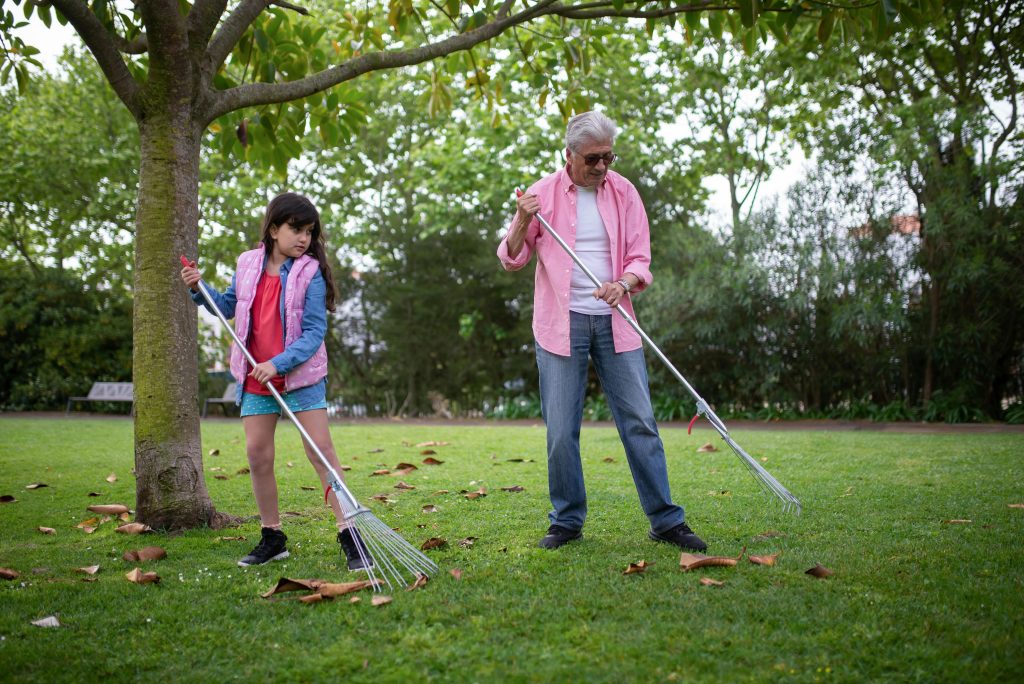It was a sunny Saturday morning. My daughter and I were on our weekly date in a cafe, playing our favourite game – people-watching and guessing the stories behind them!
At the next table sat a family that instantly drew our attention: a little boy of about seven, surrounded by six adults – two parents and four doting grandparents. We observed that the boy was the undeniable sun of their small universe; everything revolved around him.
Grandparents wanted to order Italian, but the boy was adamant about Chinese food. So, four adults compromised and agreed to have Chinese. My daughter whispered to me, “Isn’t this wrong, mumma? Why can’t his grandparents have Italian?” I couldn’t answer this one!
The grandparents were probably meeting the boy after a long time. They were trying to have a conversation. But the boy didn’t even glance up. His gaze stayed on the tablet until he declared, “This game’s boring. Buy me the premium one.”
What happened next was almost cinematic: six adult hands moved in perfect synchrony, reaching for wallets and phones. The transaction of love was swift and silent. Within moments, the new game was purchased.
I was awaiting the boy’s response. But to my surprise, the boy didn’t smile, didn’t even say thank you. He simply resumed playing. I sipped my coffee, half amused, half unsettled. I glanced at my daughter. I knew exactly what she was going to say, “Do I behave like this child?” I just nodded my head no.
I drifted off thinking about this child with every comfort that money and love could provide, yet he looked unimpressed. I couldn’t shake off the thought: What happens when so many pockets pour endlessly into one small hand?
The answer was – Six Pocket Syndrome
A Modern Parenting Paradox
That family we met in the cafe was going through Six Pocket Syndrome – one child, backed by six adults, each with a pocket full of love, money, and intention, pouring endlessly into a single little world.
That day lingered in my mind. I kept thinking, when did love start looking like an endless supply of “yes”? When did care become consumption?
Those six adults weren’t villains; they were doing what every family does best – giving, protecting, and nurturing. But somewhere between affection and abundance, the balance had quietly tilted.
What is Six Pocket Syndrome, exactly?
Six Pocket Syndrome is a situation, rather than a clinical diagnosis. A family where a single child receives attention and support from multiple adults is said to have the six-pocket syndrome. In this case, adults are referred to as pockets.
The family includes a set of parents (2), maternal grandparents (2), and paternal grandparents (2), making a total of six. Such a child becomes the centre of attention, indulgence, and the adults’ finances.
Six Pocket Syndrome is a modern parenting paradox where too much love, too many wallets, and too little restraint may be quietly shaping an entire generation. It makes me wonder: are we raising children to be happy, or simply satisfied? And is there even a difference anymore?
The Origin of Six Pocket Syndrome
In the 1970s, China implemented the one-child policy. This was meant to control population growth in the country. However, due to declining birthrate and dwindling workforce, it was officially ended in 2016.
Due to the one-child policy in China, every child was supported by two parents and four grandparents. This resulted in the princely upbringing of the child. Gradually, children during those days became overindulgent and less resilient.
As children did not have siblings to share their lives with, they became socially awkward. They did not learn how to manage failure due to increased entitlement since birth. Also, due to the attention of six adults, children got the habit of instant gratification.

Why Six Pocket Syndrome has become common
Despite non-existent one-child policies, family size is shrinking across the globe. Couples are opting for smaller, nuclear families. Such families have higher purchasing power with higher disposable incomes.
Generally, such couples, where both of them earn and have a single kid, are referred to as DISK (Double Income, Single Kid) and couples with no kids are referred to as DINK (Double Income, No Kids).
Families with a single child have grandparents who are more engaged with the child, and hence, the focus on the child is intense. The child, thus, seeks instant gratification and continued attention.
How Six Pocket Syndrome affects children
Children raised under these dynamics may bear both subtle and obvious effects. Here are the main areas:
1. Impatience and Entitlement
I came across a child who couldn’t decide between chocolate and strawberry ice cream. His mother solved this dilemma for him, saying, “You can have both!” And this was what the child did whenever he faced a dilemma – he had both the options. Until…
Until he was asked to choose a career, he couldn’t decide whether he wanted to be a lawyer or an engineer. A man who, throughout his childhood, had the benefit of getting all that he wanted, did not know how to solve his dilemma.
Kids who get everything they point at often grow up thinking the world runs on their wishlist. Patience? Never met her. The moment life says, “Adjust a little,” they roll their eyes and say, “Why should I?” After all, they’ve been trained to believe they can and should have it all.
2. Reduced resilience & coping skills
Resilience isn’t something you’re born with – it’s built one “oops,” “uh-oh,” and “try again” at a time. When kids are shielded from every bump and bruise, they miss out on life’s best teacher: experience.
As a childcare expert puts it, “Overprotection and overindulgence might look like love, but they often raise entitlement, not endurance.” So when the real world says “no,” such kids don’t just stumble; they melt.
A little pressure? They bake. A tiny conflict? They crumble. Because without setbacks, they never learn how to bounce back.
3. Social and emotional issues
Children who grow up among over-pampering adults do not learn how to behave with their peers. They do not learn to share or compromise. What if you get everything that you wish for on your platter, every single day? Yes, privilege.
Surrounded by a fan club of grown-ups, these little stars are often showered with applause. Their tiniest triumphs hit social media faster than breaking news. Soon, they start believing they’re superheroes, capes optional, ego mandatory.
But here’s the catch: when validation becomes oxygen, success starts feeling empty without applause. As they grow, these kids might not know how to handle a “no”, snapping under pressure or sulking at the slightest criticism. In short, too much sugar in childhood can make for some very brittle adults.
Repercussions of Six Pocket Syndrome on Parents
Six Pocket Syndrome is a modern parenting paradox, wherein parents plan for a single kid for complete attention, financial stability, and emotional availability. However, the child becomes accustomed to this complete attention and constant validation, which later becomes a problem.
Multiple Styles of Parenting
Six Pocket Syndrome often results in different parenting styles. One parent might want to discipline, while the other prefers a lenient approach. While one set of grandparents expresses their love with gifts, the other set might compensate by allowing overeating or overconsuming screen time. There might be variations in the style of parenting, but in the hullabaloo, the child doesn’t know what’s correct.
Parenting Guilt
Many families have both parents working. Their busy schedules make them emotionally unavailable to children most of the time. This unavailability is often compensated for with gifts and pampering.
This results in overcompensation that feeds into the six-pocket syndrome. The child unconsciously takes advantage of this guilt, and parents ultimately have to pay for it.
Taken for Granted
When a child gets everything he wishes for, the consequences show up later. Here’s a simple case in point. My friend’s son used to ask for a pencil every time she returned from a business trip. “It’s just a pencil,” she’d say, indulging him each time.
Fast forward to today. He’s 15 and no longer wants pencils. Now, he expects a new gadget every time she’s back. She’s exhausted, running out of options and patience.
What began as a harmless gesture turned into a habit of entitlement. The pencil wasn’t just stationery for him; it became compensation for her absence.
Emotional Disconnect
When a child is constantly rewarded and supported by multiple adults, the focus subtly shifts from connection to performance. Parents start measuring love through achievements and material gestures rather than shared moments or emotional closeness.
Over time, the child grows self-assured but emotionally distant. Conversations become transactional, about grades, trophies, and goals, while genuine bonding fades into the background.
The Applause Anxiety:
A deeper worry brews in new-age parents’ minds – will my child still perform when the applause stops? Six Pocket Syndrome conditions children to seek validation rather than inner satisfaction. When no one claps, they may lose motivation or confidence.
Parents, who once celebrated every success, now watch with unease as their child struggles to self-drive. This fear – that external praise has replaced intrinsic purpose – often keeps parents anxious long after the report cards stop coming home.

How to prevent Six Pocket Syndrome
A child who receives love, care, and attention from six or more adults often has a sense of entitlement. To prevent raising kids in such a manner, child psychologists recommend setting clear boundaries and expectations, right from the beginning. When children are taught the value of hard work and gratitude towards the simple pleasures of life, they become successful as adults.
Establish Clear Rules
When surrounded by adults, the child often has privileges regarding chores, spending, and screen time. Adults should reach a consensus to say ‘no’ even when the child throws tantrums, is angry, or is even disappointed. Adults should understand that there shouldn’t be competition regarding popularity or being the favourite adult.
Make the child Responsible
A child, at every age, should be responsible for work. Age-appropriate chores should be considered as a contribution to the family. Assigning chores with rewards has long-term repercussions on the child’s behaviour.
A child should be praised for the effort that went into completing the task rather than the result. This helps build a sense of accomplishment and self-sufficiency. Adults should delay instant gratification while teaching the importance of hard work.
Encourage thankfulness
If a child gets all that he wants at all the times he wishes to, then he often forgets to appreciate all that he has. Adults should help children appreciate what he has and encourage them to express gratitude.
When everyone in the family establishes rituals for gratitude, then the child automatically learns to do the same. Teaching children empathy at a young age helps them look beyond their needs.
Set a Good Example
When adults model contentment by expressing joy and mindfulness, they raise content kids, unconsciously. When adults avoid striving for material possessions, then children learn the same from them.
Adults should own their mistakes and take responsibility for their actions, teaching children accountability. Teaching children kindness, empathy, and mindfulness goes a long way in their upbringing.
Benefits of Six Pocket Syndrome
If you have reached this topic, then you might be thinking that six-pocket syndrome is seriously harmful. What if I say that having six adults to attend to a child cannot be that bad? Let’s discover how:
Opportunities
A child who receives attention from several adults often has more access to opportunities and resources, be it sports, hobbies, travel, and, more importantly, emotional support. Adults can help a child excel in different areas. The investment in the child increases as many adults tend to his growth.
Strong Network
When parents and grandparents are involved in a child, there tends to be a strong emotional network. Also, a child learns cultural traditions and transitions from grandparents through stories and transmissions. A child surrounded by multiple adults has many role models. This helps improve emotional security and stability.
Confidence Building
A child who is encouraged and nurtured in different ways by several adults often develops strong self-confidence. Such children are go-getters and become bold leaders. However, when children are given a false sense of accomplishment by adults, it might lead to problems.
Supportive Ecosystem
New-age parents are often working, resulting in a weak support system for the child. When grandparents are available to attend and love the child, it builds a strong and supportive ecosystem.
Exceptional Outcomes
Parents can learn to channel the resources available – grandparents’ attention, adequate income, constant support, and others to build a strong and content child rather than a spoiled one. Rather than simply indulging the child, adults can bring up an emotionally strong child.
Final Thoughts
So, yes, Six Pocket Syndrome might not be a syndrome at all if there is balance. It’s not all doom and gloom. It can be seen as an alchemy pot wherein all the right ingredients have been added, like the responsibilities, support, and boundaries to be fed to a child who receives love, guidance, and attention and not just indulgence.
As families shrink, six-pocket syndrome has become the norm rather than the exception. Instead of sweeping problems under the carpet, manage the support system for the advantage of the child. Because our main objective isn’t to bring up just a highly successful child, we want a grounded, empathetic, and adaptable human. Happy parenting!







Leave a Reply